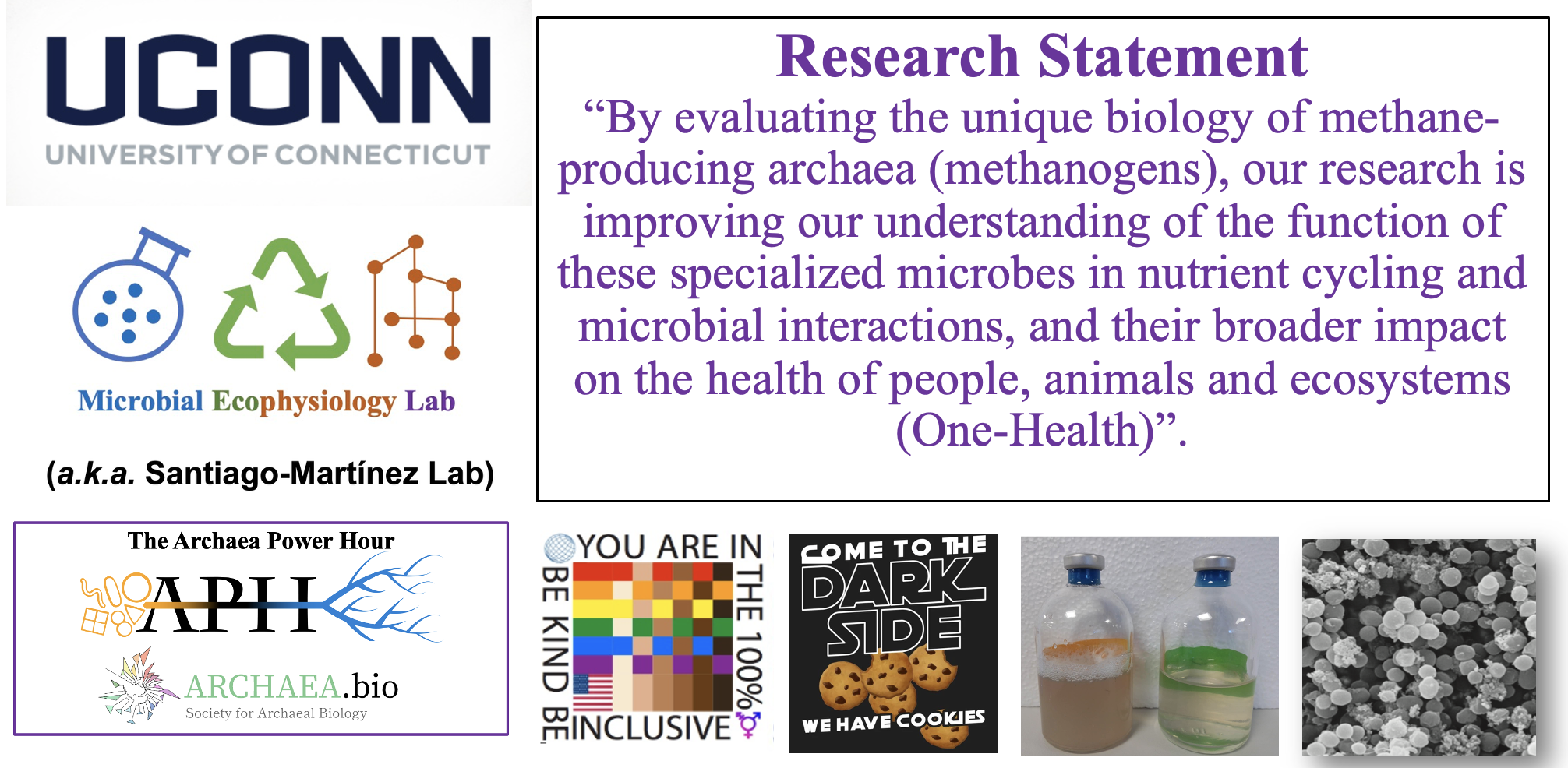Methane-producing archaea (also known as methanogenic archaea or methanogens) are a group of oxygen-sensitive microorganisms of the domain Archaea that inhabit a wide range of ecosystems and host-associated microbiomes. These microorganisms are key components of nutrient cycles, anaerobic digestion and biogeochemical processes in light- and oxygen-free environments, as they transform the byproducts of microbial fermentation into energy, biomass, and biogas (e.g., methane, carbon dioxide and hydrogen) by using a specialized energy-conserving pathway called methanogenesis.
The long-term goal of our research program is to understand the regulation of cellular processes in methane-producing archaea. We can use these microorganisms to control the biological production of biogas, biofuels, and bioproducts, as well as promote the health of people, animals, and ecosystems (a One-Health approach).

Role of methanogenic archaea in human and animal health
PROJECT 1: Evaluating the physiology of Methanobrevibacter smithii
Methanobrevibacter smithii is the most abundant methanogenic archaeon found in human microbiomes (gastrointestinal tract, respiratory tract, skin and mouth). We are using this microbe as an emerging model to study the role of methanogenic archaea in human health.
Our motivation: Methanogenic archaea are increasingly associated with gastrointestinal disorders and other human diseases linked to impaired nutrient uptake in the host and microbiome. Some significant gaps in our knowledge of human-associated microbiomes, particularly in the gut-microbiota-brain axis, are the limited understanding of how the metabolism of oxygen-sensitive microorganisms regulates the levels of SCFAs and gases that affect human health as well as how nutrient availability triggers their stress responses and cell-cell interactions. This is particularly important since SCFAs are linked to numerous health benefits and methanogenic archaea may contribute to regulating SCFAs levels in human-associated microbiomes.
Our approach: Our research projects seek to leverage our expertise in microbial physiology and protein biochemistry to explore the biology of human-associated methanogenic archaea and their impact on human health. Our research aims to improve the interpretation of microbiome data from human populations by uncovering missing mechanistic knowledge about how methanogenic archaea contribute to maintaining healthy levels of acetate (a short-chain fatty acid) and gases in human-associated microbiomes and how mucosal biofilms influence cell-cell interactions.
Publications (coming soon):
Funding (updates coming soon):
Role of methanogenic archaea in ecosystem health
PROJECT 2: Evaluating the physiology of Methanosarcina acetivorans and its response to environmental stress.
Methanosarcina acetivorans is an emerging model methanogenic archaeon living in coastal sediments, marine sediments, and wastewater digesters. We are using this microbe as a model to study the role of methanogenic archaea in health of ecosystems and microbial interactions.
Our motivation: Methanosarcina acetivorans is a genetically tractable microbe that possesses a unique metabolic versatility. This microbe is capable of using acetate and methyl-containing compounds in methane production pathways without requiring hydrogen. Therefore, we use this microbe to study electron transfer mechanisms and oxygen-independent respiration, as well as the cellular responses to oxidative stress, nutrient starvation and light-induced stress.
Our approach:Our research focuses on the mechanistic investigation of the regulation of cellular processes in methanogenic archaea under stress. We combine our extensive expertise in microbial physiology, biochemistry, and genetics to better understand the molecular mechanisms that regulate nutrient uptake and the production of methane, carbon dioxide, and biomass under stress, with a particular emphasis on the regulation of metabolic pathways associated with energy homeostasis and byproduct synthesis.
Key publications:
1) Light-induced stress in methane-producing archaea (coming soon)
2) Mechanisms of biofilm formation in marine methanogens (coming soon)
4) Preprint: Carbonic anhydrase plays multiple roles in acetotrophic growth of a model marine methanogen from the domain Archaea
Funding (updates coming soon):